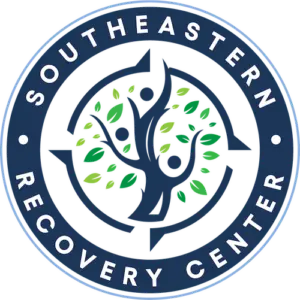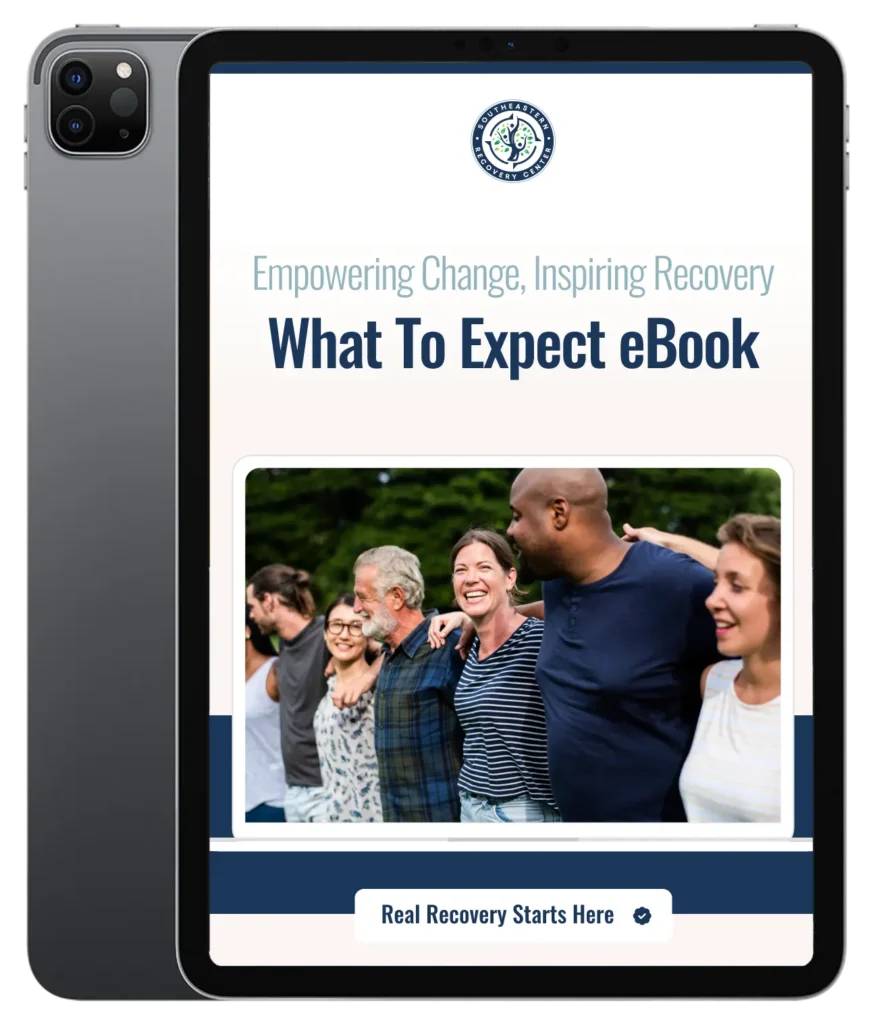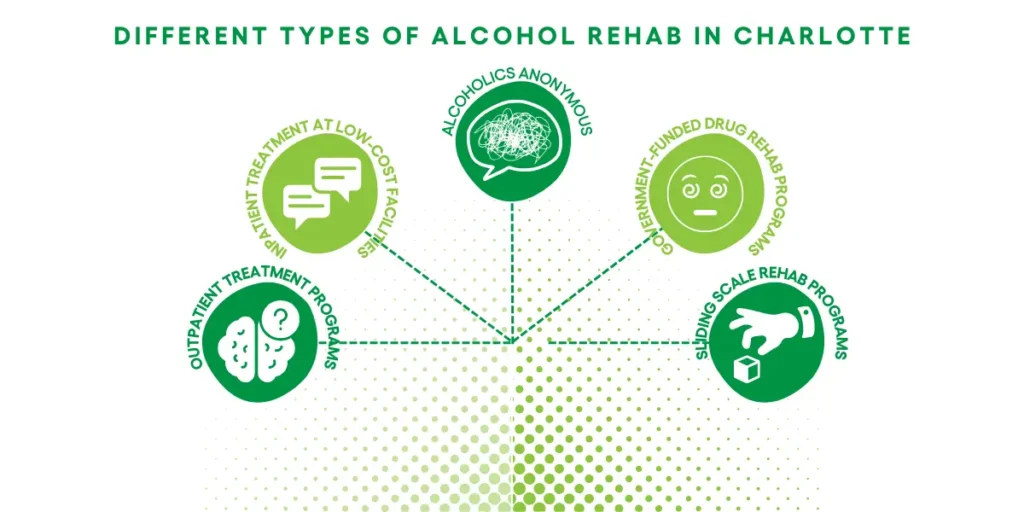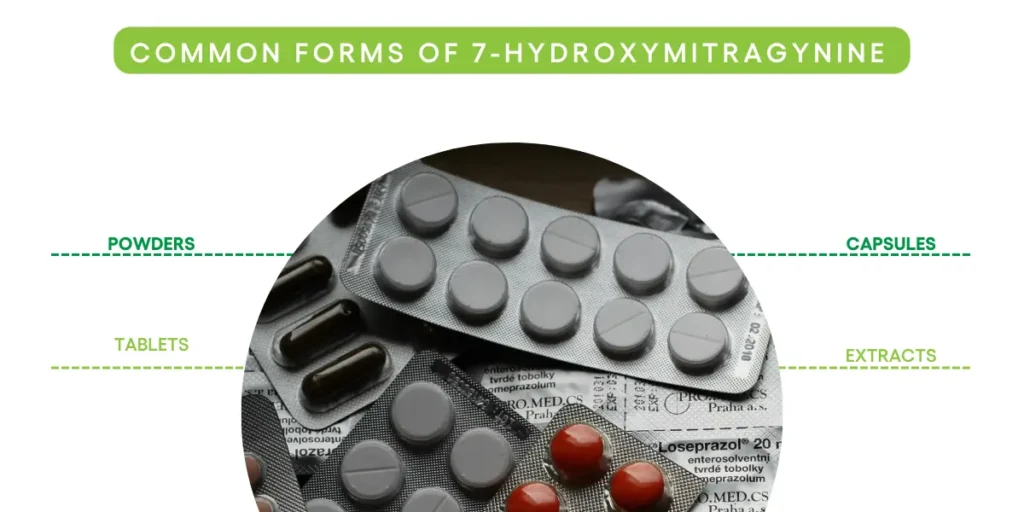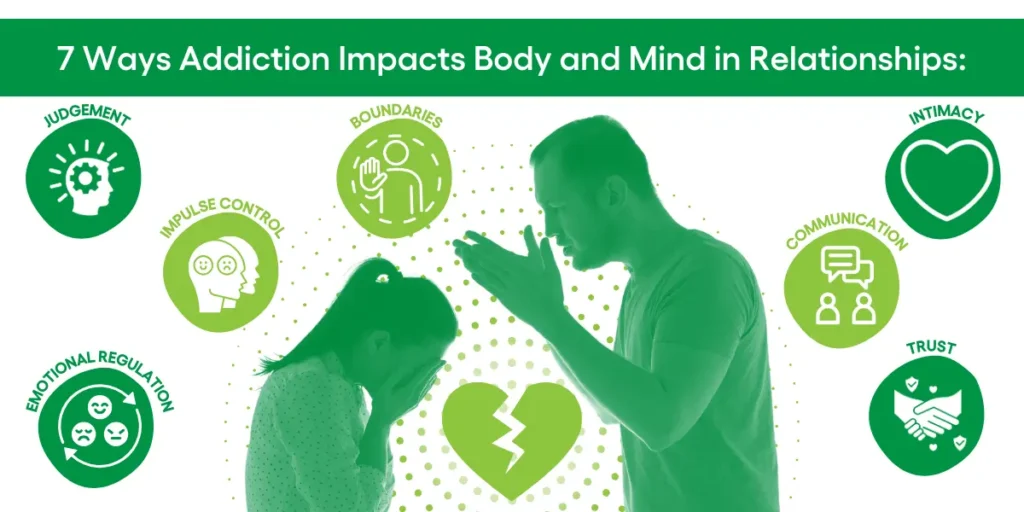Support groups offer a safe space for recovering addicts & family members to work through their emotions, discuss setbacks, and create a space where they can share without being judged – these groups facilitate long-term recovery and success.
Substance use addiction affects not just the person who’s addicted but also their family and the people close to them. Even though families are always affected, we usually don’t think about the emotional and financial pressures that addiction puts on them. The National Institute on Drug Abuse says that the medical and public health costs of untreated addiction run to many billions of dollars every year, but the emotional toll and devastation of broken trust in addicted families is much harder to measure.
The Ripple Effects of Addiction on Families
Addiction doesn’t only happen by itself; it has lots of effects that mess up family dynamics, relationships, and mental health.
Families might feel:
- Lasting Distress: When someone we care about is addicted, we feel many emotions. We feel worry that never stops. But we also feel many other emotions. We feel anger and guilt. We also feel shame and fear. All these emotions are part of the nasty mix of feelings we feel when someone we care about is addicted.
- Breaking Down Communication: The secrecy and denial caused by addiction weaken trust and make it hard to understand each other.
- Inadvertently Support the Addiction: Sometimes, when families try to help their loved ones who are addicted, they unknowingly make things worse. They do this by supporting the addiction. Even “nice things” like taking over chores or giving money can become part of the addiction. It’s part of the sick relationship between the addict and the helper.
- Embarrassment About the Addiction: Families often don’t look for outside help because they’re scared of being embarrassed. When people are ashamed, they’re more likely to stay alone. Getting over this fear and stepping outside can bring much-needed help to families who are struggling.
- Financial Strains: Using drugs and alcohol puts a serious financial strain on people and makes it hard to pay for basic needs. People with substance use problems often find themselves dealing with costs that come straight from their addiction, like: Paying for therapy or rehab, health bills, both expected and unexpected.
The Role of Support Groups in Family Healing
Support groups do more than give you somewhere to share your feelings.
Families who have struggled with addiction get a lot of help from support groups. These groups are a big part of the healing process. They are where family members go when things get really hard. In these groups, they find people who get it because they’ve been through it too. They find safe spaces to share their stories.
1. Shared Understanding and Validation
It’s really comforting when people get what you’re going through, especially when it comes to the things some of us have to deal with because we love an addict. In my experience, not many people understand this kind of thing. But when I share a room with other members during a meeting, I often feel like I’m in a place that really gets me. These are my people, because they have gone through the same things I’ve faced.
2. A Non-Judgmental Environment
Support groups give families a safe place where they can talk openly about their problems without worrying about being judged. They can be themselves and say what they really feel and think. When someone we love is fighting cancer, our lives are turned upside down. Support groups help us find a little balance again.
3. Education and Awareness
Many organizations provide educational tools to help families understand addiction and why it isn’t a moral failing. With talks and information, families can learn about the science of addiction, its recovery stages, and how to communicate well. This knowledge helps families understand what their loved ones are going through and how to support them better while also taking care of themselves.
4. Developing Coping Mechanisms
Groups for families of loved ones with mental illness share ways to deal with stress and life changes after a loved one is diagnosed. When we talk about coping, we mean the skills and knowledge to handle ongoing mental health problems. Judging by how much people talk about coping skills, you’d think they’re the main reason for support groups. But they’re really just one part of what a support group gives.
5. Encouragement for Self-Care
Support groups are changing families’ lives. They teach families to take care of themselves so they can help their loved ones more. When families focus on the addict, they almost always ignore their own needs. But that’s a sure path to burnout. Support groups teach families to do the opposite. They learn to love and nurture themselves first. Then they can give that love to the addict they say they want to help.
6. Building Hope and Resilience
Listening to other people who have gone through the same thing and have come out okay can bring hope back. Support groups are a place to talk and remind families, “Look, recovery is really happening to some of us. It can happen to you, too.
Types of Support Groups for Families of Addicts
A study on support groups shows that social support for addicts can come in many forms and depending on which one is right for the individual – they can be extremely effective in long-term recovery.
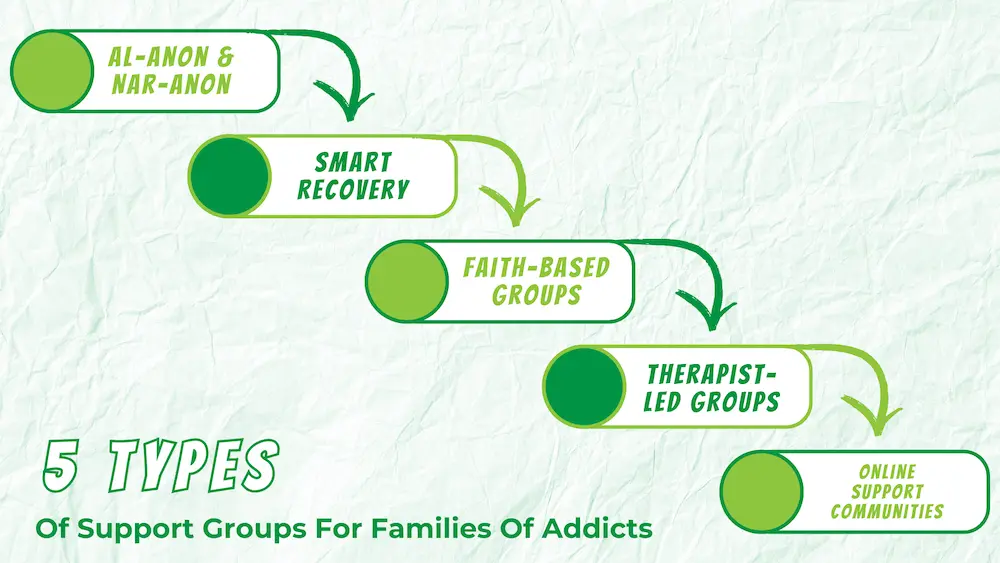
Support groups can have different structures, focuses, and ways of doing things. Here are some typical types:
1. Al-Anon and Nar-Anon
Al-Anon and Nar-Anon are groups for people whose family members have alcohol or drug problems. These groups are kind of like Alcoholics Anonymous and Al-Anon. They follow the 12-step program. The steps focus on personal growth and getting stronger spiritually. The main message of the steps is: “Accept what you can’t change; make yourself better for the future.” In other words, these groups help families to accept the big changes they have to live with. Then, they help the families work on themselves. This is so they can get better in the future.
2. SMART Recovery for Family & Friends
Unlike 12-step programs, SMART Recovery is based on evidence. SMART stands for Self-Management and Recovery Training. It’s a program that helps people with addictions and their families and friends. Compared to other programs, it focuses more on teaching ways to handle situations better and improve thinking skills. The goal is to make logical decisions, mostly about staying away from harmful substances and behaviors.
3. Faith-Based Groups
Addiction is a heavy burden for any family. Faith-based recovery groups around the country offer an alternative to the often lonely journey of addiction in the family. Prayer is a key part of these mutual-help groups. They believe talking to God is an effective way to heal families suffering from addiction. Some families choose this path because they like being with others who have the same beliefs and values.
4. Therapist-Led Groups
These groups are led by licensed therapists or counselors. They guide the discussions and help support members who share their thoughts. The members talk honestly about themselves and explore deep topics. These can include family relationships, past traumas, or building mental strength. In the safe space the group provides, people are focused and open to change.
5. Online Support Communities
Online support communities let people join the virtual groups that help them most with flexible ways and some level of anonymity. For family members who can’t easily travel to support meetings and are tired of being home alone almost all the time, active communities on Reddit, Facebook, and private online forums where family members can talk freely are great virtual places to go.
Key Elements of an Effective Support Group
By giving people access to useful stuff – like articles or training – support isn’t just making things better now.
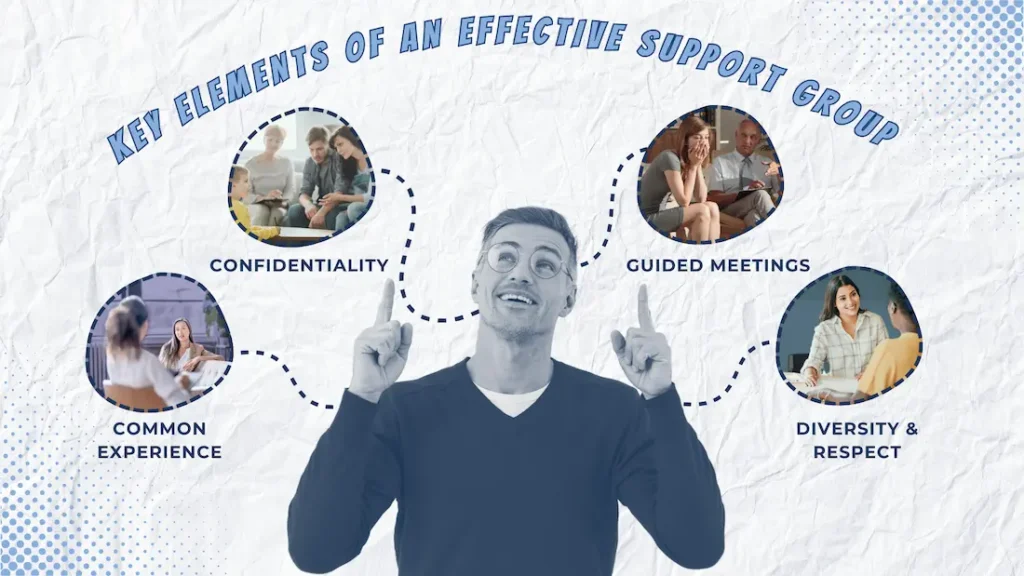
Support is also helping people get ready for problems in the future. When someone is going through a tough time, they usually need more than just kind words to help them feel better. These parts come together to build a supportive space where people can really succeed. Some common characteristics of an effective support group include:
Common Experience:
Members should have the same or similar experiences or challenges. This is only half of what makes a group safe for sharing. But it’s important because of the understanding and empathy it offers. Shared experiences are the starting point for open, safe conversations between group members.
Confidentiality:
Building trust is vital. Members need to know that what they say in group doesn’t leave the room, so they can share openly and honestly without worrying about being judged.
Guided Meetings:
A good facilitator can guide talks so that everyone in the group gets a chance to share their ideas and the group stays focused. They can do this because they know a lot about how groups work and how to solve conflicts. But even with these skills, it’s still really hard to keep discussions from going off track or stopping altogether. That kind of troubled talk is something we all want to avoid when we try to have better conversations.
Diversity and Respect:
Diversity and respect are important for support groups to work well. Effective support groups include many kinds of people. They do this by welcoming people with different identities, experiences, and views. When groups have more kinds of people, they get more perspectives. This makes the groups’ discussions and work better.
Setting Goals:
When group members set personal goals, they are more likely to find the direction and motivation they need. Progress, no matter how small, is celebrated by the group to keep members engaged and focused on the goal.
It’s really important to attend meetings regularly if you want to build good relationships that last a long time. There’s no better way to do this than by having regular and consistent meetings as a group.
FAQs About Support Groups for Families of Addicts
What should I expect at my first meeting with a support group?
When you go to your first meeting, you’ll be in a friendly, private place. Usually, we start by introducing ourselves. Then, it’s like a guided conversation or discussion. You can do what feels right for you. If you’re new, just sit quietly and listen. You can ask questions if you want. You can even share your own experiences if you feel comfortable enough to do that.
Can support groups help even if the one I care about hasn’t started recovery?
Definitely, groups that offer support can help you reduce stress, set clear boundaries, and take better care of yourself even when your family member or close friend isn’t recovering from addiction.
How can my family find the right support group?
Select a group that suits you. Pick a 12-step program or a different support group. Use SMART Recovery, which is based on evidence. You can find groups online, ask your doctor, or check places like Southeastern Recovery Center. Visit different groups to see which one you like best.
A Path Toward Collective Healing
Groups for families of addicts help a lot. They help turn pain into healing and chaos into clarity. They are the weak hands of brave families. These families try to understand the addiction map. They aren’t walking the path alone but supporting someone who is.
When families use the resources of support groups, they really help their loved ones in recovery. But that’s not the only thing families do to help. They also start discovering who they are again, what they want to do, and how to live life well. Living well is more than just going through the motions or sticking to the rules of a 12-step program.At Southeastern Recovery Center, we’re all about healing. That healing is for those who are stuck in addiction and for the families who have been hurt. We’re here to help with that journey, in any way we can.
